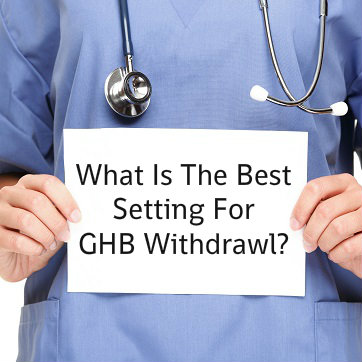Study Helps Doctors Choose Best Setting For GHB Withdrawal
GHB is the common shorthand for gamma hydroxybutyrate, a drug of abuse identified as both a “club drug” and a “date rape” drug. People who use this drug repeatedly over time can develop a severe form of drug withdrawal that has the potential to produce fatal results. In a study published in February 2014 in the journal Drug and Alcohol Dependence, a team of Dutch researchers investigated the best options for treating individuals affected by GHB withdrawal. These researchers concluded that the appropriate option varies according to any given person’s level of involvement with GHB use.
What Is GHB?
 GHB occurs naturally inside the human brain, but only in small amounts. Trace amounts of the chemical also appear in certain types of wine and beer. A specific form of pharmaceutical GHB, called sodium oxybate (Xyrem), has legitimate medical use as a treatment for the sleep disorder narcolepsy. However, access to this medication is strictly controlled through federal law, and most people who use/abuse GHB recreationally rely on illegally produced batches made by clandestine drug manufacturers.
GHB occurs naturally inside the human brain, but only in small amounts. Trace amounts of the chemical also appear in certain types of wine and beer. A specific form of pharmaceutical GHB, called sodium oxybate (Xyrem), has legitimate medical use as a treatment for the sleep disorder narcolepsy. However, access to this medication is strictly controlled through federal law, and most people who use/abuse GHB recreationally rely on illegally produced batches made by clandestine drug manufacturers.
GHB alters normal brain and body function by reducing the rate of communication inside the central nervous system. The baseline effects of this reduction include both sedation and a form of euphoric intoxication. In addition, roughly two-thirds of all users of the drug lose consciousness. The euphoric and sedating effects of GHB largely account for its use as a club drug. The sedating and unconsciousness-producing effects of GHB largely account for its use as a date rape drug; its use as a date rape drug also stems from its ability to trigger amnesia. Other known potential effects of GHB use include hallucinations, nausea, vomiting, confusion, headaches and loss of body control. People who overdose on the drug can develop seizures, experience a dangerous decline in normal lung function, go into a coma or die.
Addiction To GHB And Withdrawal From It
When used repeatedly over time, GHB can trigger the long-term changes in brain function required to produce substance addiction. One of the classic signs of any form of drug or alcohol addiction is the onset of withdrawal symptoms when substance use ends or tapers off rapidly. In the case of GHB addiction, potential withdrawal symptoms include excessive sweat production, a highly anxious mental state, uncontrollable body tremors and sleeplessness. Some people develop severe forms of these symptoms that can lead to highly debilitating or even fatal changes in brain and body health.
What Is The Withdrawal Treatment Setting?
In the study published in Drug and Alcohol Dependence, researchers from three Dutch institutions sought to establish guidelines for the best way to address the effects of GHB withdrawal. They undertook this work because, despite the potentially severe nature of this withdrawal, some individuals may recover well in an outpatient setting rather than in a hospital. The researchers began the project by gathering case studies of patients going through GHB withdrawal from 40 professionals specializing in addiction medicine. These case studies were reviewed by another 15 addiction specialists who made recommendations for hospitalization or outpatient care for each patient under consideration. In the study’s third and final stage, five specialists with extensive experience in treating GHB withdrawal reviewed the rationale used for assigning any given patient to hospitalization or outpatient treatment.
All told, 20 patients going through GHB withdrawal were assessed and/or reviewed by the three groups of experts. The researchers concluded that two main factors account for the decision to either hospitalize a person going through withdrawal or recommend outpatient treatment: the amount of GHB used each day and the frequency of GHB intake. As a rule, patients who take 32 grams or more of the drug every day and use the drug at least every two hours require hospitalization when going through withdrawal. Patients who take smaller daily amounts of the drug and use the drug less than every two hours are potential candidates for outpatient withdrawal treatment.
The authors of the study published in Drug and Alcohol Dependence note that people with diagnosable psychiatric problems who go through GHB withdrawal may also require hospitalization rather than outpatient care. Conversely, people with strong support networks have an increased chance of receiving outpatient treatment when going through withdrawal. The authors believe that, overall, their work provides a solid framework that doctors can use when determining the best treatment setting for a person withdrawing from GHB use.



